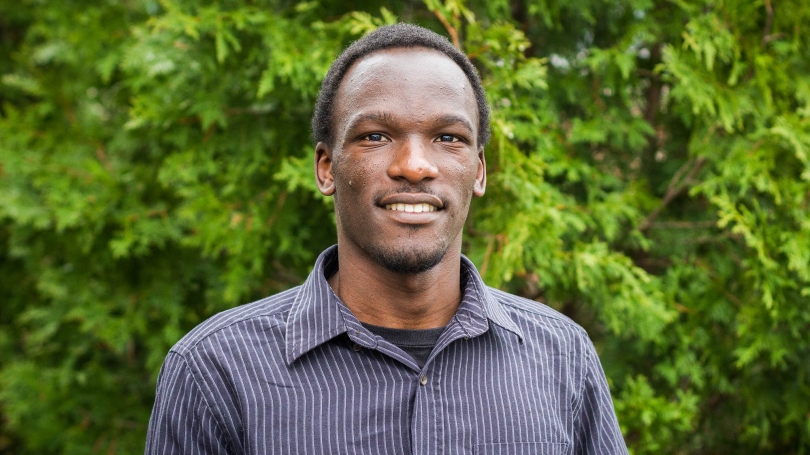
Menu
- About
- Consultation
- Programs
- Resources
- News & Events
Back to Top Nav
Back to Top Nav
Back to Top Nav
Andrew Nalani’s work and studies have taken him to Brazil, Canada, and across the United States, but through his research he remains strongly connected to his hometown of Kampala, Uganda. A member of the Class of 2016, Nalani has been working on a multi-year project of developing and improving the curriculum for a youth leadership program he founded in Uganda.
Nalani, who is majoring in religion modified with women’s, gender and sexuality studies and environmental studies, is a recipient of the Penelope W. and E. Roe Stamps IV Leadership Scholar Award. He has worked with Frances Ekii, a student at the College of Wooster in Ohio, and with Dartmouth’s Terry Osborne, a Senior Lecturer in the Environmental Studies Program, on a project titled, “Transformative Learning and Youth Leadership Development in East Africa.” He has also collaborated with advisors at the Yale Center for Emotional Intelligence, the Dartmouth African Student Association, and with Bill Nisen, Associate Director of the Institute for Security, Technology, and Society.
Nalani recently sat down with the Web Services Content Corps Team to talk about his project.
How did your project come to fruition?
In 2012, in my last year of high school at the United World College in New Mexico, I joined a social entrepreneurship incubator. This platform asked the question, what is your vision for what you want to bring to the world? I began imagining creating a youth program in Uganda.
Between 2012 and 2014 I did leadership and group facilitation trainings with the organization Partners for Youth Empowerment and I learned about residential program organization and management through two trainings and an internship with the Dartmouth Center for Service. Finally, I worked with Abuubakar Ally, a Harvard student from Tanzania, and we received the Davis Projects for Peace Award and a Tucker Fellowship.
In the summer of 2014, with the external funding and in collaboration with the NGO In Movement: Art for Social Change, we were able to host our youth program, The African Youth Leadership Experience, in Uganda. I received the Stamps Scholarship in the summer of 2015 and I’ve used the funds to redesign and revise a curriculum better suited for an ongoing program.
Why does your project matter? How can others benefit from your research?
With the Western education we are exposed to on the African continent, much of the focus is on learning in-classroom knowledge—science, mathematics, etc. But that knowledge is happening at the expense of socio-emotional skills. My program helps to fill the gap between the measurable, academic components being taught by the schools and the healthy development of young people. My central question is how do you design educational institutions to really support and prepare young people for lifelong learning? I want to use knowledge of human development and psychology to create healthy learning environments.
What is the biggest surprise or obstacle you have faced while working on your project?
It’s been a process of managing the uncertainty of a research-based experience, as well as being intentional and reflective on the nature of the knowledge I am co-creating and the ethical issues involved in creating knowledge in a Western setting and applying it on the African continent.
What is the value of research, and the value of research with experiential learning?
I think experiential learning combined with a research experience pushes the boundaries of what we know and allows one to move beyond a siloed creation of knowledge. Experiential learning and research also grant us the challenge of translating science into useful knowledge.
What advice would you give to an aspiring Stamps Scholarship applicant?
No question is too small. Begin with the questions that keep you awake at night. Do not be afraid to push the boundaries of what is possible within the walls of Dartmouth. Choose advisors and people who are willing to support you as you move through your work and the program. Do not be afraid to stretch and fail.
What are your plans for after graduation?
I will be pursuing a master’s degree in education with a concentration in human development and psychology at the Harvard Graduate School of Education. After that, I’m considering a PhD in education with a concentration in human development and psychology. I would eventually like to teach and do research while supporting the work that’s going on in Uganda.
The Penelope W. and E. Roe Stamps IV Leadership Scholar Awards provide undergraduate students an opportunity to create and pursue their own experiential learning project. Each Stamps Scholar receives up to $10,000 over the course of their final two years at Dartmouth. Half of the funds come from Dartmouth, the other half from the Stamps Foundation.